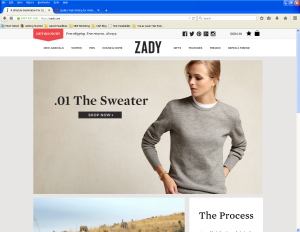
Homepage Zady.com.
“Consumers prize authenticity, so companies like the online retailer Zady attach narratives to their wares.” (NYTimes 12.28.14)
Where does the stuff you buy come from? Does anyone really care? Do you need to add authenticity to your website?
According to the New York Times Sunday Business section (12.28.14) in an article about the online store, Zady.com, the answer is yes. Authenticity, heritage, and brand story seems to have helped the company grow from just six people in August of 2013 to 20 employees now.
Looking at the site, I’m struck by the stories behind each of the products. There’s clothes, house/home, office, and more, with the brand story and heritage behind each product and its components. Detailed, upfront product descriptions so buyers know exactly where the items come from.
This is a great opportunity for you to use this idea to enhance your website content.
Get the Hang of Website Authenticity by Looking at Zady.com
First, the Title Tag beautifully states the company’s unique selling proposition (USP), “A Lifestyle Destination for Conscious Consumers.” Conscious means fully aware or sensitive to something. So Zady’s keyword here is “conscious consumers” or people who care where their products come from.
Now let’s click on one of the products. When you get to the Sales Page you’ll find an interesting, well written catalog description of the item. But then you get much more.
There’s a list titled Why It’s Special, which might include that it’s Environmentally Conscious (repeats the description of the ideal buyer), Handmade, High Quality Raw Materials, Locally Sourced, Made in the USA.
Then you’ll see narratives about the manufacturers, farmers, and/or craftspeople who actually made the product!
This all reminds me of the “buy local” movement popular now throughout the country. Here in the Utica area of Central New York State, it’s the popularity of localavores where people are doing everything they can to buy their food from farms within their local community.
If your customer persona's point to people who care about where their products come from, then your brand story, and the narratives of your suppliers can be used to satisfy the demand for conscious buying.
How to Satisfy Your Customer’s Urge for Genuine Authenticity
You can start by making some changes to these pages:
Sales Page
If there is an interesting story to tell about where you get your ingredients, parts, or components, go ahead and tell it below your product description. And remember to keep your customer profile in mind as you create your sales page. Appeal to your customer’s sense of authenticity and confidence in companies that have been in business for any length of time.
About Us Page
Here’s where you tell your story, state your company’s mission, and specifically relate it to what you can do for your customers that’s different than the competition. On my website, I talk about my experiences owning an insurance agency and as a book publisher to prove my content writing and marketing skills.
Home Page
Get your Unique Selling Proposition above the fold, preferably in your headline on the homepage. Zady’s USP is that they are a source for conscious consumers. My USP is right there in the headline of my homepage. I draw on my heritage in the editing/publishing business to state that not only do I help businesses plan and organize their online content strategy, but I also help them write it. In other words, I act like a publisher to improve the performance of your website.
When I grew up in the 60s, people knew the local business owners personally and were aware of their heritage and brand story. If you can establish that same connection online, you’ll engage the right audience and make it much easier for them to click, “Yes.”
There’s more to like about Zady.com. It has informative, useful photos, it’s clear about its free shipping and free returns, and the web content writing is very good. But see if you can improve the Sales, About, and Home pages on your website with narratives that creates confidence in your customers’ minds.
Until next time,
Nick
Nick Burns is an SEO web writer specializing in persuasive copywriting and content marketing. He provides clients a winning content strategy plus the special web writing to make it work. You can contact Nick here.
